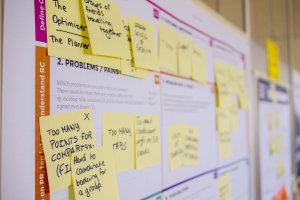By Adlina Atikah Amran
The public sector, traditionally seen as inefficient and bureaucratic, has embraced the importance of transformation in its operations.
In recent years, this has seen governments around the world adopting the ‘lab’ methodology as a problem-solving tool to catalyse transformation. In essence, labs are a facilitated environment that encourages robust discussions between various stakeholders to develop solutions for specific issues. This setting allows for innovative ideas to take shape which can yield positive outcomes. These ideas will then lead the team to pursue a process, agenda or programme to implement the idea with accountability, clear determinants of roles, budget and milestones to achieve success.
In Malaysia, thousands of people from various backgrounds came together in a series of labs to develop a socioeconomic agenda to transform Malaysia’s economy and uplift the lives of Malaysians. Utilised to plan, initiate and execute the National Transformation Programme (NTP), the labs were recognised as a ground-breaking approach for the country’s public sector to problem-solve, identify opportunities and implement socioeconomic reform. The labs created a collaborative environment for stakeholders to identify problems, craft solutions, recommend initiatives and create a framework for transformation for its robust implementation. It helped break down silos between agencies and bring input from subject matter experts to critically argue and resolve issues.
Through the labs, initiatives were developed to enable private sector participation in the economy, ensure sustainable public finance and increase the country’s GNI per capita. The programme’s initiatives, co-created by the public and private sector, positively impacted social development in the country, creating over 2.26 million new jobs and contributing to lifting 2.9 million individuals out of poverty as at the end of 2017.
The role of labs as a progressive and proven tool for public sector innovation has been demonstrated its adoption by governments around the world.
In Denmark, the government established Mindlab in 2002 to initially carry out the task of breaking down silos between ministries and engage in service design projects, and later on manage more complex projects such as policy-making, reform and capacity-building. One of the pioneers of labs, Mindlab has inspired the set-up of many similar labs and methodologies.
In the view of Mindlab, the public sector has more indicators for success compared with the private sector: productivity, service, changes in behaviour and democracy. Therefore, Mindlab’s methodology is based on the use of ethnography and design methods such as prototyping and testing to create solutions in collaboration with citizens, businesses and government agencies. The co-creation process leads to the invention of designs which enables problems and opportunities to be reimagined.
 Mindlab was initially intended to operate for a few years, but it succeeded in remaining relevant by focusing on current issues and always planning ahead of trends. Its reach across the government is unprecedented and has resulted in a major shift in how organisations think and work in Denmark.
Mindlab was initially intended to operate for a few years, but it succeeded in remaining relevant by focusing on current issues and always planning ahead of trends. Its reach across the government is unprecedented and has resulted in a major shift in how organisations think and work in Denmark.
In 2018, Mindlab was evolved and replaced by the Disruption Task Force, a unit set up by the Prime Minister of Denmark, to move Denmark’s public sector transformation to a new phase. This involved digitally reforming Denmark’s civil service, building on Mindlab’s legacy of enabling and encouraging recursive intervention to resolve issues and embedding the culture of innovation within the government.
In South Korea, Seoul’s Mayor Park Won-soon established the Seoul Innovation Bureau (SIB) in 2013 with the objective to transform Seoul into a city of innovation. The idea was brought about to bring radical changes across the government by getting ideas from citizens and working with departments to implement them. This is done with the aim to eliminate excessive bureaucracy. Thus, its key tool has been to engage citizens in getting ideas and sharing resources for city policies through its “Sharing City” initiative.
One of the most significant and popular citizen-led transformation facilitated by SIB is Seoul’s night bus. The idea was sparked by a citizen on Twitter, which was supported by many others. The SIB then used data from people’s phones in the planning of late-night bus routes, guided by the locations of 3 billion phone calls. Currently, the buses run on eight routes between midnight and 5am.
In 2018, the SIB will be launching a living lab to try out solutions for some of the most complex forces shaping the city – rising property prices, youth unemployment, healthcare, the sharing economy and technology. It plans to employ a combination of diverse methods to gather and test ideas via pilot projects, workshops and conferences.
 The adoption of the lab methodology globally has shown how labs help governments deep dive into specific subject areas and get their implementation programme right at the start to ensure the success of their transformation agenda. However, whilst the labs are an innovative tool and environment to chart out a true north for any transformation agenda, it is only an initial step of a transformation.
The adoption of the lab methodology globally has shown how labs help governments deep dive into specific subject areas and get their implementation programme right at the start to ensure the success of their transformation agenda. However, whilst the labs are an innovative tool and environment to chart out a true north for any transformation agenda, it is only an initial step of a transformation.
The real work comes after a roadmap with clear deliverables, accountability and deployment of resource has been laid out, and discipline of action is practiced in executing the carefully designed programmes to achieve tangible and measurable outcomes. As demonstrated by global experiences, the implementation of public sector agendas can only succeed with the presence of clear accountability, rigorous monitoring and problem-solving in a recursive manner.
PEMANDU Associates coordinates and facilitates labs and provides assistance in monitoring implementation of public sector transformation and business turnaround. Our lab methodology, part of PEMANDU Associates’ BFR 8-Step Methodology, enables the delivery of solutions through robust analytics and discussions from a myriad of individuals involving the public and private sector, as well as subject matter experts. If you’d like to find out how a lab can be constructed and adapted to your needs, do not hesitate to contact our team of consultants at [email protected].